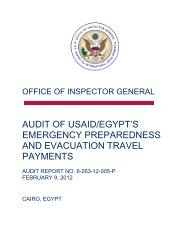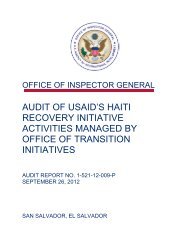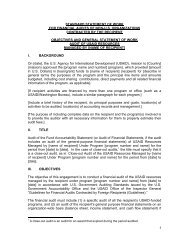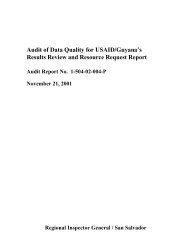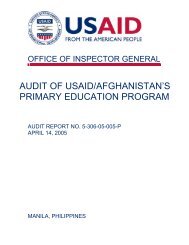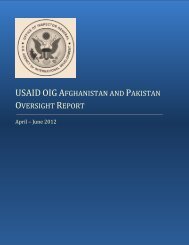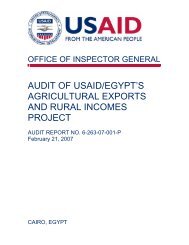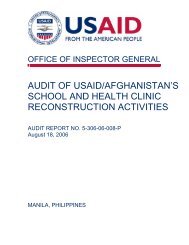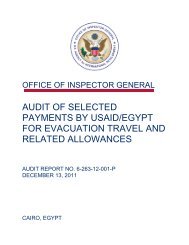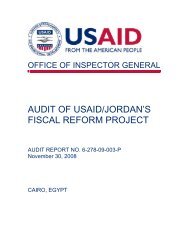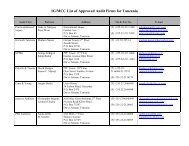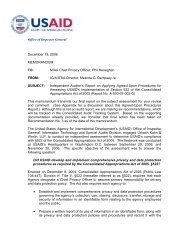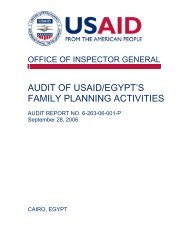Audit of USAID/Haiti's Public Law 480 Title II Programs
Audit of USAID/Haiti's Public Law 480 Title II Programs
Audit of USAID/Haiti's Public Law 480 Title II Programs
Create successful ePaper yourself
Turn your PDF publications into a flip-book with our unique Google optimized e-Paper software.
sponsors into the statement <strong>of</strong> work for the final evaluation <strong>of</strong> the current <strong>Title</strong> <strong>II</strong> program, whichshould conclude on December 31, 2012. Based on the mission’s proposed actions and timeframes for completion, a management decision has been reached.Recommendation 4. FFP and <strong>USAID</strong>/Haiti do not agree with the recommendation to developa cost estimate for implementing the first 1,000 days approach to make sure potentialcooperating sponsors incorporate sufficient resources in their budgets. FFP states that the cost<strong>of</strong> such an activity depends on variables that are specific to each potential partner. Additionally<strong>USAID</strong>/Haiti does not believe this recommendation is appropriate because it relates to future<strong>Title</strong> <strong>II</strong> multiyear development programs that have not been designed or awarded at this time.ADS 200.3.5.4 points out that inputs are necessary to achieve the outputs identified, and, assuch, a complete identification <strong>of</strong> inputs is essential to preparing the budget estimate requiredbefore a project can be approved. After several years <strong>of</strong> implementing the first 1,000 daysapproach, FFP should be able to develop an estimate <strong>of</strong> the costs associated with implementingthis approach to at least roughly evaluate partner proposed expenditures and determinewhether they are reasonable. FFP issued a request for application for a 5-year <strong>Title</strong> <strong>II</strong> programin Haiti that includes a requirement for the first 1,000 days approach. At least one currentMYAP partner identified resource constraints as a factor in not being able to fully implement theapproach. ADS Chapter 595, “<strong>Audit</strong> Management Program,” states that a reasonable effort mustbe made to complete corrective action on audit recommendations within 1 year <strong>of</strong> amanagement decision. This should be sufficient time for implementing the recommendationwhether the MYAP is awarded in FY 2012 or 2013. A management decision has not beenreached for this recommendation.Recommendation 5. While <strong>USAID</strong>/Haiti agrees to include in its monitoring a question relatedto validating whether activities related to the first 1,000 day approach are being implemented, ifappropriate, it disagrees with the recommendation because it relates to future <strong>Title</strong> <strong>II</strong> multiyeardevelopment programs that have not been designed or awarded at this time.The recommendation is related to the future <strong>Title</strong> <strong>II</strong> program because it will have a greaterimpact to a program just starting than to one just ending. The request for application for the<strong>Title</strong> <strong>II</strong> program in Haiti was issued January 18, 2012, and proposals were due April 19, 2012,with an anticipated start date <strong>of</strong> July or August 2012. The request for application stipulates theuse <strong>of</strong> the first 1,000 days, which appears in a list <strong>of</strong> <strong>USAID</strong>/Haiti and FFP’s priority objectives.Developing a plan for monitoring the implementation <strong>of</strong> the first 1,000 days is a timely measureduring the design phase <strong>of</strong> the program. ADS Chapter 595, “<strong>Audit</strong> Management Program,”states that a reasonable effort must be made to complete corrective action on auditrecommendations within 1 year <strong>of</strong> a management decision. This should be sufficient time forimplementing the recommendation whether the MYAP is awarded in FY 2012 or 2013.Furthermore, the recommendation is consistent with <strong>USAID</strong> policy for applying analytical rigorand incorporating continuous learning for adaptive management based on risks andopportunities. A management decision has not been reached for this recommendation.Recommendation 6. <strong>USAID</strong>/Haiti does not agree with the recommendation to obtain expertfood security technical assistance in the development <strong>of</strong> the FY 2013 MYAP indicatorperformance tracking tables. Mission <strong>of</strong>ficials said it is standard practice to use technicalassistance efforts from FFP’s contractor FANTA <strong>II</strong>I for monitoring and indicator workshops.However, <strong>USAID</strong>/Haiti asserts that the recommendation is not appropriate because it relates t<strong>of</strong>uture <strong>Title</strong> <strong>II</strong> multiyear development programs that have not been designed or awarded at thistime.17



